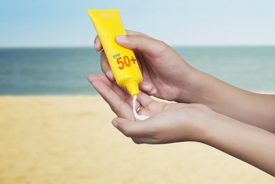Let's talk about skin cancer
Previous skin cancer

Anyone who has had a basal or squamous cell cancer has much higher chance of developing another one.
Long-term or severe skin inflammation or injury.
Scars from severe bums, areas of skin over serious bone infections and skin damaged by some severe inflammatory skin diseases are more likely to develop skin cancers.
Psoriasis treatment
Psoralens and ultraviolet light treatments given to some patients with psoriasis can increase the risk of developing squamous cell skin cancer and probably other skin cancers.
Reduced immunity
The immune system helps the body nght cancers of the skin and other organs.People with weakened immune systems, like people who are treated with cortisone or medicines to avoid rejecting of a transplant, are more likely to develop non-melanoma skin cancer. People infected with HIV, the virus that causes AIDS, often have weakened immune systems and are also at Increased risk for basal and squamous cell cancer.
Smoking
People who smoke are more likely to develop squamous cell skin cancer,especialty on the lips.
Sun Exposure
Exposure to ultraviolet rays is a major risk for most skin cancers including melanomas; sunlight is the main source of ultraviolet rays.
Melanoma Skin cancer
Melanoma accounts for less than two percent of skin cancer causes but causes a large majority of skin cancer deaths.
The rates of melanoma have been rising for at least 30 years.
Melanoma is more common in whites than in African Americans. overall, the lifetime risk of getting melanoma is about 2 percent (1 in 50) for whites, 0.1 percent (1 in 1 ,000) for blacks. and 0.5 percent (1 in 200) for Hispanics.
Ultraviolet (UV) light exposure
Sunlight is the main source of uv rays. Tanning lamps and beds are also
sources of UV rays.
People who get a lot of uv exposure from these sources
are at greater risk for skin cancer. including melanoma Both UVA and UVB
rays damage skin and cause skin cancer. UVB rays are a more potent cause
of at least some skin cancers, but based on what is known today, there are no
safe UV rays.
If you have a skin lesion that has any of the following characteristics, you should consult a cancer specialist:
• Red or very dark lesion
• Wound that does not heal or bleed easily
• Any stain or nodule greater than 6 millimeters
• Spot or mole with irregular or asymmetrical edges
• Any mole that changes color or features or grows

